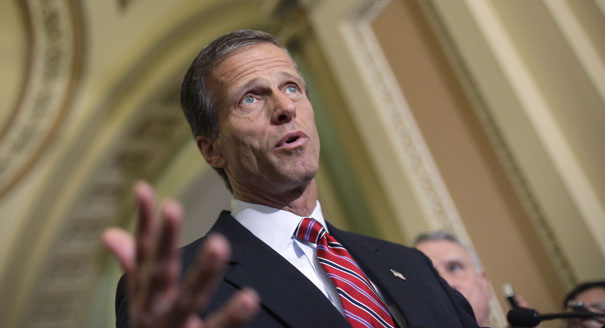Hill Takes Aim at Title II As GOP Seeks Compromise
The smarter way to stay on top of the multichannel video marketplace. Sign up below.
You are now subscribed
Your newsletter sign-up was successful

A flurry of activity on Capitol Hill last week lent support to cable operators and other Internet service providers, the targets of President Obama’s regulatory ambitions.
It wasn’t the cavalry, but Republicans newly in control of both the House and the Senate rode in on what they hoped would be bipartisan legislation — although no Democrats were on board by press time — to give the Federal Communications Commission explicit authority to prevent some Internet practices without resorting to “the nuclear option,” and to extend those to wireless broadband.
The president’s declaration that the FCC should reclassify Internet access under Title II regulations — more like how utilities are regulated (see Cover Story) — could make it difficult to get Democratic support.
The bill would prevent blocking, discrimination and paid prioritization, and would even apply the regulations to wireless broadband. But it would also limit the FCC’s Section 706 forbearance authority, something that will not please Democrats.
One of the two Republican leaders who worked on the draft, new Senate Commerce chairman John Thune (R-S.D.), spelled out 11 key parts of the legislation that sounded like a net-neutrality activist’s wish list, save for the part about no Title II.
Those Thune principles included: “Prohibit blocking, prohibit throttling, prohibit paid prioritization, require transparency, apply rules to both wireline and wireless, allow for reasonable network management, allow for specialized services, protect consumer choice, clarify that Section 706 of the Telecommunications Act may not be used as a grant of regulatory authority, and direct the FCC to enforce and abide by these principles.”
Two hearings are scheduled this week on the bill, which contained all of those things and defined the reasonable network management and specialized services that would be allowable, as well as the paid prioritization that would not be.
The smarter way to stay on top of the multichannel video marketplace. Sign up below.
One hearing is in the House Energy & Commerce Communications Subcommittee and one is in Thune’s committee. Key to those hearings is the reaction of Democrats; if at least one highprofile Democrat gets on board, it could create hope for some kind of compromise.
That will be a tall order, as will getting bipartisan support for a bill that does not include the Title II reclassification that the president and party leader requested. In coming out strongly for Title II, unless he changes course, President Obama has drawn a line that Democrats would have to cross to support a non-Title II approach.
Republicans would clearly be giving something up if they were to agree to net rules at all, much less to banning paid prioritization and applying the rules to wireless broadband.
The National Cable & Telecommunications Association, which has been pushing hard against Title II, was cautiously optimistic as NCTA president Michael Powell was set to be a witness at the House hearing on the rules.
“We are encouraged by the potential of Congressional discussions on network neutrality,” the NCTA said in a statement. “While we will reserve judgment on specifics, we believe Congress can play a constructive role in offering meaningful open-Internet rules that avoid the collateral damage of ill-fitting Title II regimes, including the real costs that consumers would suffer from greater government control over the Internet and the years of disruptive litigation and marketplace uncertainty.”
Contributing editor John Eggerton has been an editor and/or writer on media regulation, legislation and policy for over four decades, including covering the FCC, FTC, Congress, the major media trade associations, and the federal courts. In addition to Multichannel News and Broadcasting + Cable, his work has appeared in Radio World, TV Technology, TV Fax, This Week in Consumer Electronics, Variety and the Encyclopedia Britannica.

